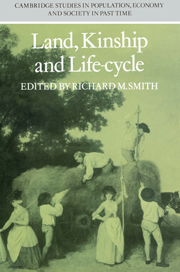Book contents
- Frontmatter
- Contents
- List of contributors
- Preface
- 1 Some issues concerning families and their property in rural England 1250–1800
- 2 Population pressure, inheritance and the land market in a fourteenth-century peasant community
- 3 Families and their land in an area of partible inheritance: Redgrave, Suffolk 1260–1320
- 4 Population changes and the transfer of customary land on a Cambridgeshire manor in the fourteenth century
- 5 Industrial employment and the rural land market 1380– 1520
- 6 Changes in the size of peasant holdings in some west midland villages 1400–1540
- 7 The erosion of the family–land bond in the late fourteenth and fifteenth centuries: a methodological note
- 8 Changes in the link between families and land in the west midlands in the fourteenth and fifteenth centuries
- 9 Kinship in an English village: Terling, Essex 1550–1700
- 10 The myth of the peasantry: family and economy in a northern parish
- 11 Poverty, poor relief and the life-cycle: some evidence from seventeenth-century Norfolk
- 12 The receipt of poor relief and family situation: Aldenham, Hertfordshire 1630–90
- 13 Widows in pre-industrial society: an essay upon their economic functions
- 14 Real property, marriage and children: the evidence from four pre-industrial communities
- 15 The nineteenth-century peasantry of Melbourn, Cambridgeshire
- Consolidated Bibliography
- Index
7 - The erosion of the family–land bond in the late fourteenth and fifteenth centuries: a methodological note
Published online by Cambridge University Press: 19 October 2009
- Frontmatter
- Contents
- List of contributors
- Preface
- 1 Some issues concerning families and their property in rural England 1250–1800
- 2 Population pressure, inheritance and the land market in a fourteenth-century peasant community
- 3 Families and their land in an area of partible inheritance: Redgrave, Suffolk 1260–1320
- 4 Population changes and the transfer of customary land on a Cambridgeshire manor in the fourteenth century
- 5 Industrial employment and the rural land market 1380– 1520
- 6 Changes in the size of peasant holdings in some west midland villages 1400–1540
- 7 The erosion of the family–land bond in the late fourteenth and fifteenth centuries: a methodological note
- 8 Changes in the link between families and land in the west midlands in the fourteenth and fifteenth centuries
- 9 Kinship in an English village: Terling, Essex 1550–1700
- 10 The myth of the peasantry: family and economy in a northern parish
- 11 Poverty, poor relief and the life-cycle: some evidence from seventeenth-century Norfolk
- 12 The receipt of poor relief and family situation: Aldenham, Hertfordshire 1630–90
- 13 Widows in pre-industrial society: an essay upon their economic functions
- 14 Real property, marriage and children: the evidence from four pre-industrial communities
- 15 The nineteenth-century peasantry of Melbourn, Cambridgeshire
- Consolidated Bibliography
- Index
Summary
It has been argued forcefully by many students of the village land market, including contributors to this volume, that the conditions of supply were significantly different in the late middle ages from what they had been earlier. The family sense of inseparable association with a particular holding, which had been so marked a feature of rural society in the early middle ages, weakened; indeed, in some cases it more or less disappeared. The change is usually interpreted as reflecting the growing abundance of land in this period, and the declining importance of inheritance as the mode of acquiring it. Heirs are assumed to have had no need to wait for long periods for the succession to the family holding, as other land became available in the meantime and proved attractive.
Rosamond Faith, a pioneer in the documentation of an active land market in the fifteenth century, noted that this trend began in the fourteenth century. She stated that while the
idea that land ‘ought to descend in the blood of the men who had held it of old’ is of course common in many peasant societies … there does seem to have been a period in English history – roughly that of the fourteenth and fifteenth centuries – when in many rural communities this fundamental idea was in practice abandoned. Family claims to land were disregarded or seldom pressed, and in place of the strict and elaborate arrangements which had previously governed the descent of land, there came to be no laws but those of supply and demand.
- Type
- Chapter
- Information
- Land, Kinship and Life-Cycle , pp. 295 - 304Publisher: Cambridge University PressPrint publication year: 1985



